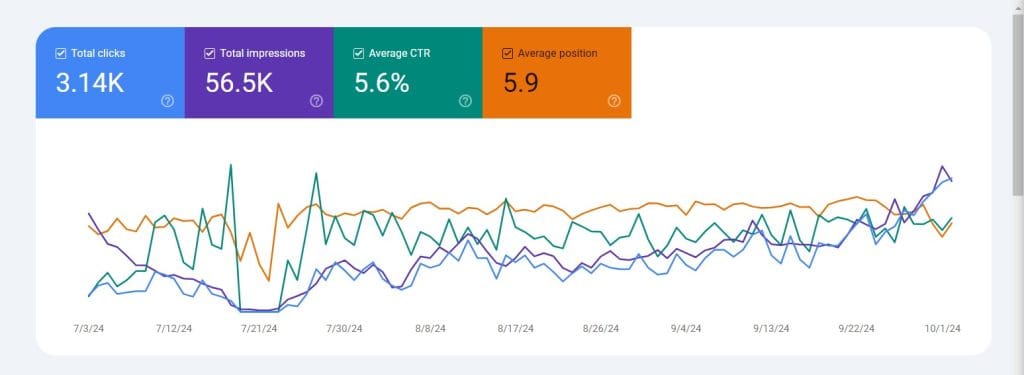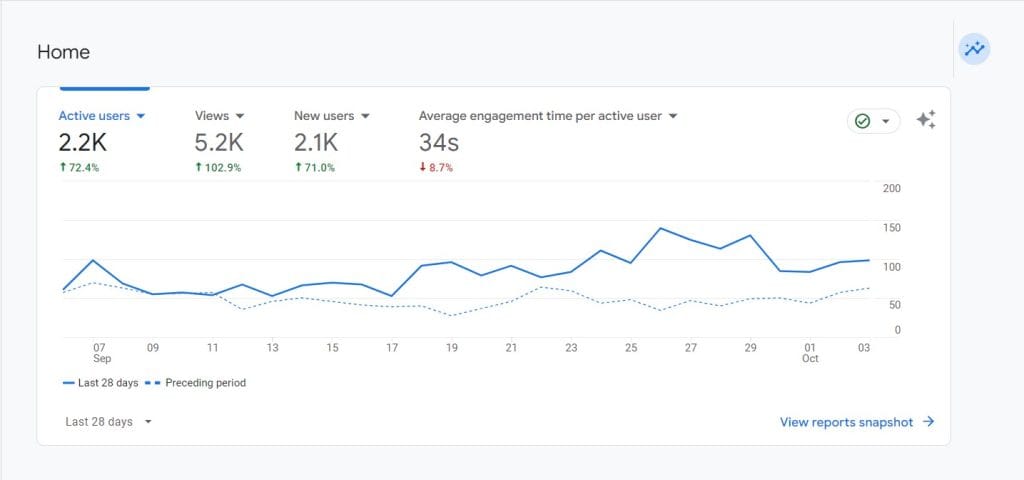In today’s digital world, search engine optimization (SEO) is key for success online. It helps small businesses and big websites alike. By optimizing your site, you can get more visitors, be seen more, and make more money.
1. Keyword Research
Identify relevant keywords using tools like Google Keyword Planner, SEMrush, or Ahrefs.
Focus on long-tail keywords that match user intent.
2. On-Page SEO
Title Tags: Include primary keywords in your title tags (under 60 characters).
Meta Descriptions: Write compelling meta descriptions (150-160 characters) that include keywords.
Headers: Use H1 for your main title and H2/H3 for subheadings. Incorporate keywords naturally.
Content: Create high-quality, original content that provides value to users. Aim for 1,000+ words where appropriate.
Images: Use descriptive filenames and alt tags for images to enhance accessibility and SEO.
3. Technical SEO
Site Speed: Optimize images and minimize code to improve loading times.
Mobile Friendliness: Ensure your website is responsive and mobile-friendly.
Secure Site: Use HTTPS to secure your site.
Sitemap: Create and submit an XML sitemap to search engines.
4. Internal Linking
Use internal links to guide users to related content and improve navigation. This helps search engines understand your site structure.
5. External Linking
Link to reputable external sites when relevant. This can improve your credibility and provide additional value to readers.
6. Backlink Building
Build quality backlinks from reputable websites. This can include guest posting, collaborations, or getting featured in industry directories.
7. User Experience (UX)
Focus on intuitive navigation, clear CTAs (Call to Actions), and an engaging design. A good user experience can reduce bounce rates.
8. Regular Updates
Keep your content fresh and relevant. Regularly update existing posts and add new content.
9. Analytics and Monitoring
Use tools like Google Analytics and Google Search Console to track performance, understand user behavior, and identify areas for improvement.
10. Stay Updated
SEO best practices change frequently. Stay informed about the latest trends and algorithm updates.
By following these steps, you can enhance your website’s visibility and ranking on search engines. It takes time and consistent effort, but the results can significantly boost your online presence.
11. Local SEO
Google My Business: Create and optimize your Google My Business listing. Ensure all information is accurate and complete.
Local Keywords: Incorporate local keywords into your content to target users in your geographical area.
Citations: Build citations on local directories and ensure consistency of your NAP (Name, Address, Phone number).
12. Schema Markup
Implement schema markup (structured data) to help search engines understand your content better. This can enhance your search results with rich snippets.
13. Content Marketing
Develop a content strategy that includes blog posts, infographics, videos, and other media. Share this content on social media to drive traffic.
Consider creating evergreen content that remains relevant over time.
14. Voice Search Optimization
Optimize for voice search by using natural language and focusing on questions and conversational keywords.
15. User Engagement Metrics
Monitor engagement metrics like bounce rate, average session duration, and pages per session. High engagement signals can improve SEO rankings.
16. A/B Testing
Experiment with different versions of landing pages to see what performs best in terms of user engagement and conversion rates.
17. Social Media Integration
Promote your content on social media platforms. While social signals don’t directly affect SEO, increased visibility can lead to more backlinks.
18. Monitor Competitors
Analyze your competitors’ SEO strategies using tools like SEMrush or Moz. Identify gaps and opportunities in your own strategy.
19. Mobile-First Indexing
Ensure your website is optimized for mobile, as Google uses mobile-first indexing. Test your site’s mobile-friendliness with Google’s Mobile-Friendly Test tool.
20. Fix Broken Links
Regularly check for and fix broken links on your site. Tools like Screaming Frog can help identify these issues.
21. Image SEO
Optimize image size for faster loading times. Use descriptive filenames and alt text that includes relevant keywords.
22. Content Distribution
Share your content across various platforms and consider guest blogging on relevant sites to expand your reach.
23. Engage with Your Audience
Respond to comments and questions on your blog and social media. Building a community can enhance user engagement and loyalty.
24. Regularly Audit Your SEO
Conduct regular SEO audits to identify and rectify issues. This includes checking for duplicate content, analyzing backlinks, and ensuring all on-page elements are optimized.
25. Focus on Core Web Vitals
Pay attention to Core Web Vitals, which assess loading performance, interactivity, and visual stability. Aim

Website Vest SEO: Expert Tips & Strategies
for scores that meet or exceed Google’s thresholds.
In today’s digital world, search engine optimization (SEO) is key for success online. It helps small businesses and big websites alike. By optimizing your site, you can get more visitors, be seen more, and make more money.
This guide will share top tips and strategies for better SEO. You’ll learn how to make your site more visible and rank higher. You’ll also get to know the basics of website seo and how to how to improve seo on google. This will help you boost your seo marketing game.
A modern digital workspace with a large computer monitor displaying a colorful SEO dashboard, graphs and analytics highlighted, surrounded by SEO tools like keywords, backlinks, and website icons, an abstract representation of search engine algorithms floating in the background, vibrant colors and dynamic shapes illustrating growth and optimization.
Start exploring SEO and make your online presence shine. Get ready to improve your website’s performance and top the search engine results.
What is SEO and Why is it Crucial?
Search Engine Optimization (SEO) makes a website more visible and ranked higher in search results. It’s key for online marketing. It helps businesses and individuals get more visitors to their sites, boosting brand awareness and sales.
Understanding Search Engine Optimization
SEO is about knowing how search engines like Google work. It’s about what they look for in a website. By improving a site’s content, structure, and tech, businesses can rank better for their keywords.
The Importance of SEO for Website Visibility
In today’s world, most people start their shopping online. A good search engine optimization strategy is vital. It boosts a website’s visibility, attracting more visitors and driving sales.
| Key Benefits of SEO | Percentage |
| Increased organic traffic | 53% |
| Higher brand visibility and credibility | 34% |
| More qualified leads and conversions | 45% |
| Long-term, sustainable growth | 28% |
“Effective search engine optimization is not about tricking Google. It’s about making your website better for users.”
Keyword Research: The Foundation of SEO
Keyword research is key to a good SEO plan. Finding the right keywords helps your site reach the right people. This brings more targeted traffic and boosts your online presence. We’ll dive into keyword research and share tips to boost your site’s ranking.
Keyword research finds the terms people use to find what you offer. Knowing these keywords lets you tailor your site to meet their needs. This increases your site’s chances of showing up in top search results.
- Analyze your industry and competitors to identify the most relevant and high-performing keywords.
- Use keyword research tools like Google Keyword Planner, Ahrefs, or SEMrush to uncover valuable insights about search volume, competition, and related keywords.
- Focus on a mix of short-tail and long-tail keywords, as both can contribute to your overall SEO success.
- Incorporate the selected keywords seamlessly into your website’s content, meta tags, and other optimization efforts.
- Continuously monitor and refine your keyword strategy based on performance and changes in search behavior.
Mastering keyword research is a big step towards how to do seo for website step-by-step. It brings more relevant visitors to your site. Remember, keyword research is a continuous task. Stay updated, adapt, and keep optimizing for the best results.
“The foundation of any successful SEO strategy is built on the bedrock of thorough keyword research.”
On-Page Optimization
Techniques Developing a solid on-page SEO strategy is essential for increasing your website’s visibility. By fine-tuning key elements of your web pages, you can attract more visitors. Let’s explore two crucial techniques that can make a significant difference. Optimizing Title Tags and Meta Descriptions The title tag and meta description serve as your website’s first impression for searchers. They play a critical role in determining whether users will click on your page. Ensure your title tags are concise, keyword-rich, and relevant to your page’s content. Additionally, craft meta descriptions that entice users to visit your site. Crafting Compelling Content Quality content is the cornerstone of on-page SEO. Search engines favor websites that provide genuine value to users. Dedicate time to researching the right keywords, structuring your content effectively, and delivering valuable information. Incorporate your keywords naturally throughout your text, but avoid keyword stuffing. By mastering these on-page optimization techniques, you’ll enhance your website’s search engine ranking. Keep in mind that on-page SEO requires ongoing effort. Continuously refine your strategies for sustained success. website seo In the current digital landscape, establishing a robust online presence is crucial for any business. Website SEO (Search Engine Optimization) is an effective method to enhance your site’s visibility and draw in more visitors. It improves your ranking in search engines and attracts a broader audience. Website analysis tools are vital for successful SEO. They provide insights into your site’s performance, allowing you to identify areas that need improvement. With tools like website analyzer free and best website checker, you can find the perfect solution for your requirements. Enhancing your site’s structure is equally important. Ensure your content is easy to navigate, your pages load swiftly, and you implement effective technical SEO practices. These measures can significantly improve your site’s performance and search engine ranking. Website SEO Tool Description Key Features Google Search Console A comprehensive tool provided by Google to assist website owners and webmasters in monitoring and maintaining their sites.

Mastering off-page SEO is key in today’s digital world. There’s a lot you can do outside your website to boost your online presence. Let’s explore the main off-page strategies to help your website soar.
Link Building and Outreach
Getting high-quality backlinks is vital for off-page SEO. By securing links from reputable and relevant websites, you show search engines your content is valuable. Work on outreach, team up with influencers, and write great guest posts to get these links.
Social Media Engagement
Social media is a big deal for enhancing your online presence and improving SEO. Be active, share your knowledge, and connect with your audience. Use social media to send more traffic to your site, grow your brand, and get positive social signals.
Off-page SEO is an ongoing process. Keep an eye on your efforts, make adjustments, and keep improving. By using these tactics, you can boost your how to improve seo on google skills and set your website up for success.
Technical SEO Considerations
Building a successful website is more than just good content and design. It also needs a solid technical base. Understanding technical SEO is key to improving your website’s search engine ranking. Let’s look at the main technical factors that affect your SEO.
Site Architecture and Crawlability
A well-organized website is vital for search engines to find and index your content easily. Make sure your site’s navigation, internal links, and URL structure are set up for better crawlability and visibility.
Page Speed Optimization
Website speed is now a major ranking factor. Use image and code optimization, content delivery networks (CDNs), and server-side caching to make your pages load faster. This will give users a better experience.
Structured Data Markup
Using structured data, like Schema.org markup, helps search engines understand your web pages better. This can lead to better search result snippets, higher click-through rates, and more visibility.
| Technical SEO Factor | Importance | Best Practices |
| Site Architecture | High | Logical and intuitive website hierarchy Optimized internal linking structure Clean, search-engine-friendly URL structure |
| Page Speed | High | Image and code optimization CDN integration Server-side caching |
| Structured Data | Medium | Implement Schema.org markup Describe content context and entities Enhance search result snippets |
By focusing on these technical SEO areas, you can create a website that looks great and performs well in search rankings. Keeping up with technical SEO is essential for improving your website’s performance.
Mobile-Friendly and Responsive Design
In today’s world, mobile devices rule our online lives. Having a website that works well on all devices is key. It’s a big part of SEO that helps you be seen online.
Importance of Mobile Optimization
More people use phones and tablets to go online. Search engines like Google now focus on mobile sites first. If your site isn’t mobile-friendly, it can hurt your how to improve seo on google.
To make your site work on mobiles, follow these tips:
- Responsive design: Make sure your site changes to fit any screen size well.
- Fast loading times: Keep your site quick to load, as mobile users want fast answers.
- Mobile-friendly content: Make your content easy to read and use on small screens.
- Avoid common mobile pitfalls: Don’t use small text or hard-to-click buttons that annoy users.
By focusing on mobile, you’ll make your site better for users. This can also boost your how to improve seo on google. And it can bring more people to your site.
“In a mobile-first world, a mobile-friendly website is no longer a nice-to-have, but a must-have for any business looking to succeed online.”
Measuring and Analyzing SEO Performance
In today’s digital world, using data to improve your SEO is crucial. Tools like Google Analytics and Google Search Console help you understand your site’s performance. They show you where you can do better.
Google Analytics: Your Website’s Pulse
Google Analytics is a powerful tool for website analytics. It gives you lots of data on your site’s traffic and how users interact with it. By looking at page views, bounce rates, and session duration, you can see what’s working and what’s not.
Google Search Console: Unlocking Visibility Insights
Google Search Console works with Google Analytics to give you insights on your site’s search engine visibility. It helps you track how well your site does in organic search and shows you keyword rankings. It also spots any technical SEO problems that might be affecting your site’s visibility.
These website analyzer free and best website checker tools help you make smart SEO choices. By analyzing your website’s performance regularly, you can make your content better, target keywords more effectively, and boost your website seo checker efforts.
“Measurement is the first step that leads to control and eventually to improvement. If you can’t measure something, you can’t understand it. If you can’t understand it, you can’t control it. If you can’t control it, you can’t improve it.” – H. James Harrington
By using the insights from Google Analytics and Google Search Console, you can unlock your website’s full potential. This will help you grow sustainably and improve your online presence.
Local SEO: Optimizing for Local Searches
In today’s digital world, a strong local SEO strategy is key for businesses that need local customers. By optimizing your website and online listings, you can get more visibility in local searches. This brings in more targeted traffic from your area.
To boost your local how to improve seo on google, try these strategies:
- Claim and optimize your Google My Business listing. Make sure your business details are right and the same everywhere online.
- Add locally relevant keywords to your website’s content and meta tags. This tells search engines your business is local.
- Get customers to leave positive reviews on Google and Yelp. Good reviews can really help your local search rankings.
- Join local events and organizations. Share these on your website and social media. It builds your local brand.
- Make sure your website works well on mobiles and loads fast. Local searchers often use their phones to find businesses nearby.
| Local SEO Tactic | Impact on Search Rankings | Implementation Difficulty |
| Google My Business Optimization | High | Low |
| Local Keyword Integration | Medium | Medium |
| Online Review Management | High | Medium |
| Local Community Engagement | Medium | Medium |
| Mobile-Friendly Website | High | High |
By using these how to improve seo on google tips, you can get more local visibility. This attracts more qualified leads and can increase your business’s revenue.
A vibrant city skyline with a map overlay, highlighting local businesses such as cafes and shops, pinpoints indicating search results, and a magnifying glass focusing on a specific location, surrounded by digital elements representing online searches and connectivity.
Staying Up-to-Date with SEO Trends
In the world of seo marketing, staying ahead is key. Search engine algorithms and user preferences change often. It’s vital to watch the latest SEO trends and updates.
Following top blogs, publications, and social media is a good start. They share insights, case studies, and best practices. Also, webinars, conferences, and workshops are great for learning from experts and networking.
Keep an eye on your website’s performance and analytics. Use Google Analytics and Search Console to find areas for improvement. Regularly check your site’s technical SEO, content, and off-page factors to stay ahead.
The seo marketing world is always changing. What works today might not tomorrow. Stay informed, adaptable, and proactive to keep your website ranking well and attracting the right audience.
“The key to successful seo marketing is to never stop learning and evolving. The moment you think you’ve mastered it, the game changes.”
Embracing Emerging SEO Trends
It’s also important to be open to new seo marketing trends. Keep an eye on:
- Voice search optimization
- Artificial intelligence and machine learning in SEO
- Video content optimization
- Sustainable link building strategies
- Holistic user experience optimization
By being agile and adapting to these new trends, you can ensure your website’s success in the digital world.
Conclusion
SEO is key for online success. It helps websites become more visible and attract more visitors. This leads to achieving goals.
This guide covered SEO basics. We talked about keyword research and on-page optimization. We also looked at off-page strategies and technical SEO.
Keep learning about SEO to stay ahead. Adapt to new trends and focus on a great user experience. SEO can unlock your website’s full potential online.
FAQ
What is SEO and why is it important?
SEO, or search engine optimization, makes your website more visible online. It’s key because it brings more people to your site without you paying for ads. This can boost your brand, get more leads, and increase sales.
How can I conduct effective keyword research for my website?
Keyword research is the first step in a good SEO plan. Find the main topics of your site, then use tools like Google Keyword Planner or Ahrefs. Look for keywords that lots of people search for but aren’t too competitive. Use these keywords in your content and meta tags.
What are the most important on-page optimization techniques?
Key on-page techniques include optimizing title tags and meta descriptions. Also, use header tags and create content that’s both high-quality and keyword-rich. Make sure your site is easy to navigate, loads quickly, and works well on mobile devices.
How can I improve my website’s technical SEO?
Improve your site’s technical SEO by focusing on its structure and internal links. Use XML sitemaps and robots.txt files. Also, add schema markup. Fix any crawl errors, broken links, and other technical issues to boost your site’s visibility.
What is the importance of local SEO for my business?
Local SEO is vital if you need local customers. Claim and optimize your Google My Business listing. Create content specific to your area and make sure your NAP info is the same everywhere online.
How can I measure and analyze the performance of my SEO efforts?
Use Google Analytics and Google Search Console to track your SEO performance. Look at organic traffic, keyword rankings, and other important metrics. Adjust your SEO strategy based on these insights to improve your site’s visibility and performance.






